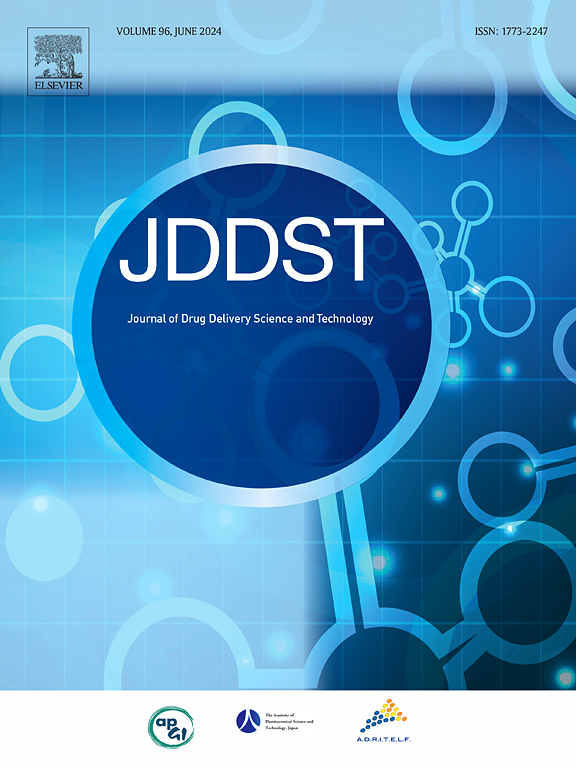石榴籽油纳米乳治疗多发性硬化症的制备及疗效评价
IF 4.9
3区 医学
Q1 PHARMACOLOGY & PHARMACY
Journal of Drug Delivery Science and Technology
Pub Date : 2025-09-16
DOI:10.1016/j.jddst.2025.107541
引用次数: 0
摘要
盐酸Fingolimod是治疗多发性硬化症(MS)的有效药物之一,多发性硬化症是年轻人神经功能障碍的主要原因。然而,它可能会有一些副作用。本研究旨在开发石榴籽油纳米乳作为芬戈莫德的递送系统,以提高其治疗效果。采用Box-Behnken实验设计,以油脂比例、poloxam188浓度、卵磷脂浓度为自变量进行优化。研究人员对患有实验性自身免疫性脑脊髓炎(EAE)的雌性C57BL/6小鼠腹腔注射含有1 mg/kg芬戈莫德的含芬戈莫德石榴籽油纳米乳(FIN-PSO NE),持续28天,随后对其进行评估。以30%油脂、5%泊洛沙姆、2%卵磷脂为原料,优选出粒径为231.26±38.80 nm、多分散指数为0.19±0.06、包封效率为99.57±0.21%的最佳包封配方。它还显示了药物的持续释放情况。扫描电镜显示其形貌光滑,尺寸分布均匀。傅里叶变换红外光谱显示该药物与纳米乳中其他成分无相互作用。此外,该配方减轻了eae诱导小鼠的神经学评分并减少了脱髓鞘。因此,它可能是治疗多发性硬化症的一个有希望的候选者。本文章由计算机程序翻译,如有差异,请以英文原文为准。

Preparation and evaluation of pomegranate seed oil nanoemulsions for delivery of fingolimod hydrochloride in multiple sclerosis treatment
Fingolimod hydrochloride is one of the available treatments for managing multiple sclerosis (MS), a leading cause of neurological disability among young adults. However, it may exhibit several side effects. This study aimed to develop a pomegranate seed oil nanoemulsion as a delivery system for fingolimod to enhance its therapeutic efficacy. A Box-Behnken experimental design was applied for optimization, with the oil proportion, poloxamer 188 concentration, and lecithin concentration selected as independent variables. Female C57BL/6 mice with experimental autoimmune encephalomyelitis (EAE) were treated intraperitoneally with fingolimod-loaded pomegranate seed oil nanoemulsion (FIN-PSO NE) containing 1 mg/kg of fingolimod daily for up to 28 days and subsequently evaluated. The optimized formulation, containing 30 % oil, 5 % poloxamer, and 2 % lecithin, showed a particle size of 231.26 ± 38.80 nm, a polydispersity index of 0.19 ± 0.06, and an entrapment efficiency of 99.57 ± 0.21 %. It also displayed a sustained drug release profile. SEM images revealed a smooth morphology and uniform size distribution. FTIR spectra indicated no interactions between the drug and other ingredients in the nanoemulsion. Additionally, this formulation alleviated neurological scores and reduced demyelination in EAE-induced mice. Consequently, it could be a promising candidate for MS treatment.
求助全文
通过发布文献求助,成功后即可免费获取论文全文。
去求助
来源期刊
CiteScore
8.00
自引率
8.00%
发文量
879
审稿时长
94 days
期刊介绍:
The Journal of Drug Delivery Science and Technology is an international journal devoted to drug delivery and pharmaceutical technology. The journal covers all innovative aspects of all pharmaceutical dosage forms and the most advanced research on controlled release, bioavailability and drug absorption, nanomedicines, gene delivery, tissue engineering, etc. Hot topics, related to manufacturing processes and quality control, are also welcomed.

 求助内容:
求助内容: 应助结果提醒方式:
应助结果提醒方式:


